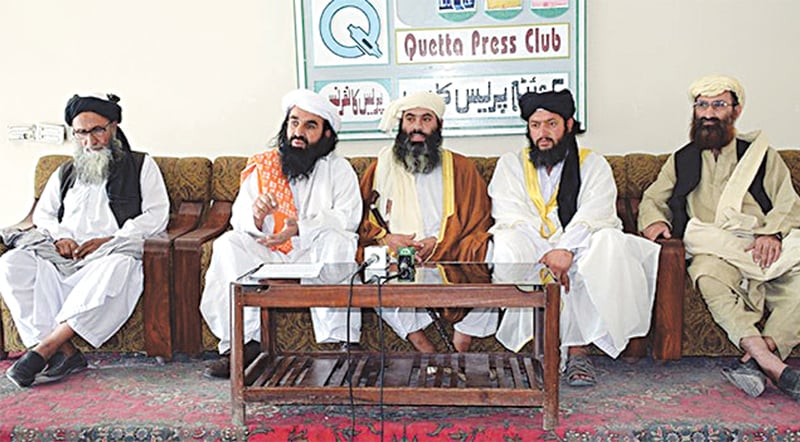Last year, one of Quetta’s senior security officials claimed that they had zero tolerance for sectarian religious groups that preached hatred for ethnic and religious minorities in the province. Recalling a raid on the madrassah run by Ramazan Mengal of the banned Ahle Sunnat Wal Jammat (ASWJ), the official said that security agencies had thoroughly searched the madrassah premises as well as his mud-and-brick home.
“There were underage students at the madrassah,” he recalls, “but Mengal was warned not to send his students out of the madrassah to collect money on roads, even though he had complained that his students would die from hunger if they stopped collecting offerings.”
The official’s claims, however, fly in the face of the political dynamics that have allowed Ramazan Mengal to contest the upcoming election in NA-266 (Quetta).
Dressed in traditional white garb, a waistcoat and black turban, the bearded chief of the madrassah, who is said to be the provincial chief of the ASWJ, would march on the streets of Quetta shouting sectarian slogans. As of late, he has been campaigning actively in NA-266, although by some accounts, he was allowed to contest the polls because he is under strict surveillance.
Most religious, nationalist and sectarian political parties in Balochistan aim to win the elections by hook or by crook. There have been reports that the National Party recently reached out to Shafiq Mengal, who is known because of his alleged ties to the militant Baloch Musalla Difa Tanzeem.
Shafiq is contesting the polls as an independent candidate from Khuzdar, where earlier his father and brother contested the polls in 1988. National Party’s Aslam Bizenjo recently met Shafiq Mengal, reportedly to seek an electoral alliance, because he, his son and Shafiq Mengal, will be contesting the elections from the same area.
Members of the National Party deny that there were ever talks of an electoral alliance with Mengal. Saad Ullah Baloch of the National Party says that Shafiq and Aslam Bizenjo had met to discuss tribal matters, not electoral affairs.
“Although Shafiq had asked for alliance with our party in Khuzdar, Aslam Bizenjo asked him to discuss it with his party chief because he does not have the authority to announce an electoral alliance,” Saad Ullah Baloch claims.
The National Party’s haste to disassociate itself from Shafiq Mengal has a lot to do with the controversy and allegations that have been directed at him. Although he has repeatedly denied all these allegations, Shafiq Mengal’s name continues to pop up in connection with several incidents of violence and terrorism in the province. He is said to have launched the Baloch Musalla Difa Tanzeem in 2008-2009, after which he contained most of his activities within the Khuzdar region. He denies having ties with the militia, which many call a death squad, which has been targeting nationalist groups fighting against the state. The group was banned in 2010.
In February 2014, a mass grave full of mutilated bodies was discovered in the Tutak area of Khuzdar. The news sent shock waves across the country. The Quetta High Court subsequently set up a tribunal to investigate the matter and several witnesses pointed to Shafiq Mengal’s involvement in the matter. The same year, a former district commissioner of Khuzdar accused him of targeting the Levies force. His name came up once again in January 2015, in the aftermath of a militant attack on an imambargah in Shikarpur, Sindh. The tribunal investigating the attack looked into his role in providing safe passage to the militants who carried out the attack. There were allegations that he had gotten close to the banned outfit, Lashkar-i-Jhangvi. However, Shafiq Mengal has consistently denied these allegations.
Shafiq Mengal’s father, Naseer Mengal, served under the military regime of General Zia-ul Haq. He was a former caretaker chief minister of Balochistan, as well as a senator. Naseer and his son Shafiq Mengal have traditionally opposed Sardar Ataullah Mengal’s family, and to this day, the two families have been at loggerheads with each other.
Shafiq Mengal will be contesting the elections in PB-36 (Shaheed Sikandarabad) and NA-269 (Khuzdar). “He has formed an alliance with Aslam Bizenjo of the NP in PB-39 (Khuzdar-II) and with his son Shah Meer Bizenjo in the PB-40 (Wadh),” insists a Khuzdar-based political analyst. He adds that Shafiq Mengal represents political aspirations of the far-right in the area.
Shafiq was sent to Aitchison College in Lahore for studies, but he dropped out and joined a Deobandi madrassah in Karachi’s Binoria Town. He attended the Shaikh Zayed Islamic Centre between 1999 and 2001. “He always prioritised madrassah education,” said the analyst.
Quetta-based observers are of the opinion that candidates representing the far-right are positioned to divide votes in their constituencies. It is unlikely that Ramazan or Shafiq will win, even though they do have sizeable vote banks. If Ramzan Mengal can seek votes using sectarian slogans, then Shafiq, too, has tribesmen and like-minded groups that would vote for him.
Published in Dawn, July 20th, 2018
















































Dear visitor, the comments section is undergoing an overhaul and will return soon.